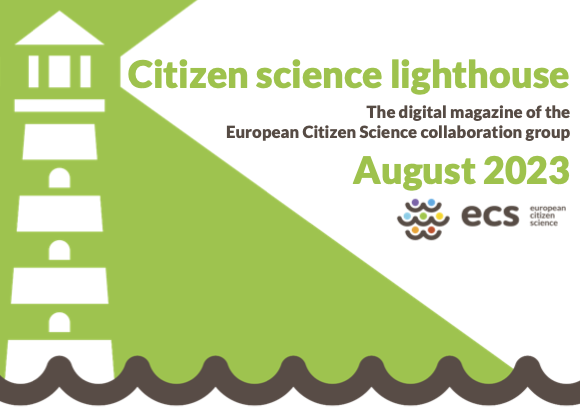
FOCUS Sharing results with citizens
Anna Sanchez Vidal
July 25, 2023, 12:38 p.m.
It is a fundamental aspect, which can sometimes turn into a challenge, to share the results with citizens, that is, with anyone who participates and contributes to a citizen science project. So much so that it is underlined by three out of the 10 Principles of citizen science.
1. Citizen science projects actively involve citizens in scientific endeavours that generate new knowledge or understanding. Citizens may act as contributors, collaborators, or as project leader and have a meaningful role in the project.
4. Citizen scientists may, if they wish, participate in multiple stages of the scientific process. This may include developing the research question, designing the method, gathering and analysing data, and communicating the results.
8. Citizen scientists are acknowledged in project results and publications.
Many tools available today to develop, implement and evaluate citizen science initiatives address this aspect. For example, the Action toolkit dedicates considerable attention to sharing and publishing results. And there are many projects currently underway that have useful ideas and contributions.
At their core, the effective sharing of research results plays a pivotal role in cultivating societal trust in the scientific community. To achieve this, it is essential to guide and provide citizens with well-informed resources that enable them to understand and interpret the data.
Customising result sharing to meet participant preferences, expectations and motivations
Story of a civic sentinel, (@aelisir illustrator fo SensJus)
When it comes to sharing research results, giving careful thought to the preferences and expectations of participants is crucial. Understanding how they intend to utilise the findings from your project allows you to personalise the dissemination process. In the Cities-Health pilot in Ljubljana, they found that while some participants may be interested in downloading the raw data and exploring it on their own, others may simply require a concise report summarising the results. By recognising and accommodating these diverse preferences, you can ensure that the results are shared in a manner that best aligns with each participant's unique needs and motivations.
Sharing results can extend beyond researchers and also involve citizens in meaningful ways. The act of sharing research results is no longer limited to researchers alone. By involving participants in sharing results, several advantages emerge, including the ability to reach wider audiences and resonate with different segments of society. Notably, participants with influential social media channels or artistic skills can contribute in unique ways, amplifying the reach and impact of the shared results. Building upon this notion, the SOCIO-BEE project has taken a proactive approach by providing a range of tools and training to empower participants and equip them with the necessary confidence and skills to effectively communicate the outcomes of the project.
Managing delay between citizens' participation and results sharing
Story of a civic sentinel, (@aelisir illustrator fo SensJus)
Managing delay between citizens' participation and results sharing means maintaining communication and engagement. There may be a time lag between citizens' participation in collecting data and the delivery of the research results. This delay poses a challenge in maintaining engagement and a sense of ownership throughout the process. However, effective communication plays a vital role in bridging this gap. In the European Citizen Science project, they provided a summary of co-creation workshops and updates to participants who were unable to participate ensures that everyone remains involved and informed.
Creative tools
Embracing creative approaches to maximise result sharing. Incorporating creative approaches can significantly enhance the dissemination of research results, even when working with limited financial resources. Surfing for Science utilises Instagram as a channel to showcase captivating images from the laboratory and share scientific data. Additionally, they leverage the production of t-shirts featuring results from samples, turning individuals who wear these shirts into “walking disseminators”. Another example is the Sensing for Justice project, which produced a graphic novel that effectively conveys the research outcomes while minimising potential political sensitivities. To further expand their reach, they have now introduced a theatre play. Blogs offer yet another avenue for sharing research results. The COESO project, for instance, leverages the power of blogging by providing each pilot with a dedicated blog to document the research process. Participants often contribute to writing blog posts. Hypotheses, a platform dedicated to humanities and social sciences research blogs, serves as a valuable resource for hosting these blogs.
Connecting with schools and science outreach activities
Connecting with schools and science outreach activities organised by universities or municipalities can enhance result sharing. The School of Ants project engaged several primary schools, an opportunity for teachers to involve pupils in creating graphs and other ways of playing with the data, where sharing results becomes a learning experience. Drawing from past experiences, the Citizen Science Contact Point at the Vrije Universiteit Brussel emphasises the significance of presenting outcomes from citizen science projects in various informal settings, including festivals and local events organised by the city or regional governments.
Authors: Anna Sanchez Vidal, David Kocman, Diego Casado-Mansilla and Florence Gignac
References
10 Principles of citizen science, https://www.ecsa.ngo/documents/#documents
Action toolkit, https://actionproject.eu/toolkit/research-implementation/results/
Cities-Health pilot in Ljubljana, http://www.environment.si/en/projects/cities-health/
Citizen science contact point, Vrije Universiteit Brussel, Belgium, https://www.vub.be/en/our-research/our-vision-and-mission/participatory-and-community-based-research/citizen-science
COESO project, https://coeso.hypotheses.org/
European Citizen Science project and platform, https://eu-citizen.science/
William P de Haan et al 2022, Floating microplastic loads in the nearshore revealed through citizen science, Environ. Res. Lett. 17 045018, DOI 10.1088/1748-9326/ac5df1
Hypotheses platform, https://hypotheses.org/
School of Ants project, https://www.schoolofants.unipr.it//
Sensing for Justice project, https://sensingforjustice.webnode.it/
SOCIO-BEE project, https://socio-bee.eu/
Surfing for Science, https://www.asensiocom